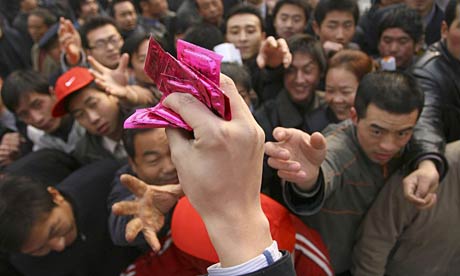
When HIV patients in Hebei heard the Chinese premier was visiting they thought their chance had come. For years they had fought in vain for compensation from hospitals which they allege spread the virus through blood transfusions.
"They knew that premier Wen [Jiabao] liked to listen to the ordinary people's voices, so they wanted to tell him about their problems," said Jiang Tianyong, a lawyer for their families.
Instead, 11 patients and relatives were detained by police as they sought Wen on his visit to Shahe, in the south of the province. A week and a half later eight are still being held. Police have refused to tell Jiang what charges could be lodged, but described it as a case of "national security".
The incident says a lot about China's fight against HIV. After years of inaction and denial, the government has begun to address the problem. High profile meetings between HIV patients and political leaders are one solution, intended to address the stigma and educate the public about the issue.
Just as significant is the hefty increase in funding for prevention programmes and antiretrovirals for patients. There are public information films and the first strategy addressing the needs of men who have sex with men - one of the highest risk groups.
"There's been a lot of change," said Wan Yanhai, director of the Aizhixing Institute and one of the country's leading Aids/HIV activists. "This generation of leaders - Hu Jintao, Wen Jiabao and Wu Yi - have met people with Aids. They have increased the national budget, opened up to international donors and they tolerate some civil society involvement in provision."
But when it comes to addressing difficult questions, when activists embarrass officials, or when it comes to implementing policy, the shortcomings of this zeal are clear. Experts fear that leaves China at risk of an epidemic if further improvements are not made.
The Joint United Nations Programme on HIV/Aids estimates there were around 700,000 HIV positive people in China at the end of 2007.
The provinces of Yunnan, Henan, Guangxi, Guangdong and Sichuan and the region of Xinjiang each have more than 10,000 affected residents.
Wan believes that the true figure is far higher and warns - as international experts have - that the virus is spreading from high-risk groups such as prostitutes, drug users, migrant workers and the gay community to the wider population. Last year saw around 50,000 new cases. Increasingly liberal attitudes to sex - yet ignorance about the risk of STDs - and a growing sex trade are adding to the problem.
"There has been a sort of sexual revolution since the market reforms," said Dr Heather Xiaoquan Zhang, a senior lecturer in Chinese studies at the University of Leeds.
"People are more open about sex - but in most cases that's in urban areas among the better educated sections of the population.
"The Confucian tradition means most people still feel embarrassed to openly talk about sex. Their knowledge of risks and vulnerabilities is quite limited."
The government has backed landmark programmes, which range from educating migrant workers on the use of condoms to commissioning public information films featuring stars such as Jackie Chan.
Yet, as Wan points out, some subjects remain beyond bounds. UNAIDS estimates that 41% of those with HIV in China were infected through heterosexual sex, 38% through intravenous drug use, 11% through homosexual sex - and almost 10% through selling or receiving blood and blood products.
The scandal over the blood-driven epidemic that spread through rural China, and particularly Henan province, was one of the factors which propelled HIV up the political agenda.
Peasants who sold their blood for money discovered they had also sacrificed their health as blood-collection services reused dirty needles.
But Wan believes that officials will not admit that transfusion was a problem - as in the Shahe case - because they are reluctant to admit to failings in the system.
"The government has admitted there's an epidemic among people who sold blood - but not among those who received it. It has not informed the public of the risk from blood transfusions and doesn't suggest people are tested," he said.
He warns that the government's top-down approach also makes it hard to tailor services to different needs, makes it easier for corrupt officials along the way to pocket cash, and offers little space for grassroots work.
The organisations which get cash focus on meeting government needs rather than those of the public: building capacity and educating but not engaging in enough direct work.
"The government is supporting work in the gay community, and that's good.
"You have more than 100 organisations working in that sector now. But you go to a bathhouse and there aren't any condoms," he said.
That leaves the essential work of engaging with high risk groups to NGOs - when they are allowed to do so. Those working in civil society argue that security preparations for the Olympics have made officials much more suspicious in their dealing with NGOs.
This week the Aizhixing Institute announced an emergency protocol to protect its staff, volunteers, colleagues and clients in the run-up to the Olympic Games.
By way of explanation it offers a tally of recent incidents, including the house arrest or surveillance of more than 100 HIV positive people and activists in the first half of March. The list begins last December, when Wan himself was briefly detained. It ends with the detention at Shahe.
Officials in Hebei did not respond to the Guardian's calls about the case.
But Jiang, who maintains that the detentions are illegal, says the Public Security Bureau has told him it needs at least a month to "execute the law".
"It is their right to want to see the premier," he added.
"The HIV/Aids sufferers and their families are innocent victims: they face pain, poverty, and prejudices against them."

